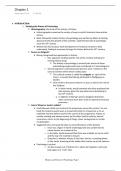Summary
Summary of History and Theory of Psychology- PSY731 (Chapters 1, 3-10, 13, 15)
- Course
- PSY731 (PSY731)
- Institution
- Ryerson University (Ru )
This document contains a comprehensive set of detailed notes taken from the textbook for PSY 731 (History and Theory of Psychology (Chapters 1, 3-10, 13, 15). The notes summarize key concepts, theories, and findings discussed in the chapters required for the course, providing a structured and acces...
[Show more]



